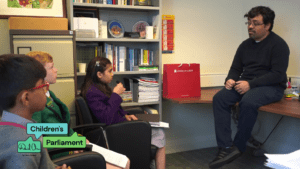In a historic meeting at the House of Lords, the top team of the UK Children’s Parliament engaged in a thought-provoking dialogue with Emad Mostaque, Co-founder of Stability AI and now Schelling AI, a visionary in the field of artificial intelligence.
This unprecedented interaction between young minds and a leading figure in AI development has catalysed the formation of a groundbreaking taskforce on AI and digital safety.
Child Chancellor of the Exchequer Aryan Shekar, Child Prime Minister Clark Dearson (11), and Child Deputy Prime Minister Naila Seetal (10) posed insightful questions to Mostaque about the future of AI and its implications for their generation.
The discussion, held in Baroness Uddin’s office, covered a wide range of topics, including the accessibility of AI tools, ethical considerations in AI development, and the potential impact of AI on education and future job markets.
Mostaque emphasised the importance of children’s perspectives in shaping the future of AI, stating, “I especially think it’s important for the children to be heard in this because you’ll be growing up as AI natives, just as the generation before you grew up as Internet natives. You’ll be using this technology every single day.”
This enlightening exchange has led to the establishment of a special taskforce on AI and digital safety by the UK Children’s Parliament. The initiative, spearheaded by Baroness Uddin, Co-Chair of both the Children’s Parliament All-Party Parliamentary Group (APPG) and the Metaverse and Web 3.0 APPG, aims to ensure that children’s voices are at the forefront of shaping policies related to AI and digital safety.
The taskforce will bring together primary-aged children with adult industry leaders, creating a unique platform for intergenerational dialogue and collaboration. Chaired by Baroness Uddin, this diverse group will work together to address the complex challenges and opportunities presented by AI and digital technologies.
During the meeting with Mostaque, the Child MPs raised important questions about the accessibility of AI tools and the potential impact of AI on future job markets.
Mostaque shared insights on the democratistion of AI tools, explaining that children can now create their own AI applications, such as homework helpers, with relative ease.
He stated, “You can make your own GPTs like a homework helper just by telling it what to do. It’s removed lots of barriers to coding. It enables you to correct your code and augment your code to make video games and more.”
Addressing concerns about AI’s impact on future job markets, Mostaque acknowledged the validity of such fears but emphasised the creation of new opportunities: “We’ve seen it with every technological revolution. And this is the largest technological revolution. But we always create new jobs. We need AI-enhanced jobs based on what Health, Education look like in the future.”
The newly formed Children’s Parliament Taskforce will focus on several key areas:
Ethical considerations in AI development and usage
Digital literacy education for children, parents, and educators
Ensuring diverse representation in AI development
Promoting transparency and accountability in AI systems
Exploring the potential of AI in enhancing educational experiences
Addressing privacy concerns and data protection for young users
By bringing together children, experts, and industry leaders, the taskforce aims to create a more inclusive and thoughtful approach to AI development and implementation, with a focus on ensuring the safety and well-being of children in digital spaces.
Baroness Uddin commented on the initiative, saying, “This taskforce is a crucial step in ensuring that the voices of our youngest citizens are heard in the rapidly evolving landscape of AI, Metaverse and Web 3.0, Quantum Computing and all digital technology. By uniting primary-aged children with adult industry leaders, we aim to create policies and guidelines that will shape a safer, more inclusive digital future for all.”
Child Prime Minister Clark Dearson expressed enthusiasm about the project, stating, “As children, we’re growing up with this technology, and it’s important that we have a say in how it’s developed and used. I’m excited to work with experts and other children to make sure AI is safe and helpful for everyone.”
The formation of this taskforce builds upon the momentum generated by the historic Children’s Parliament session organised by Baroness Uddin and Anna Firth MP, held in the House of Lords in April 2023.
That session saw primary school-aged Child MPs engaging in dialogue with executives from Google’s ParentZone, Internet Matters, Roblox, and Goldsmith’s University, demonstrating the value of including young voices in discussions about digital technologies and safety.
As the taskforce begins its work, it will continue to engage with AI developers, policymakers, and educators to ensure that the interests and safety of children remain at the forefront of technological advancements. This initiative serves as a model for other nations, demonstrating the importance of including young voices in shaping the future of AI and digital safety.
The UK Children’s Parliament Taskforce on AI and digital safety marks a pivotal moment in recognising the importance of children’s perspectives in the rapidly advancing field of AI and technology. By fostering open dialogue between young minds and industry experts, the Children’s Parliament is paving the way for a more inclusive and thoughtful approach to AI development and implementation.
As AI continues to shape our world, initiatives like this taskforce will be crucial in ensuring that the benefits of technology are realised while minimising potential risks, particularly for the youngest members of society. The collaboration between primary-aged children and adult industry leaders, under the guidance of Baroness Uddin, promises to bring fresh perspectives and innovative solutions to the challenges posed by AI and digital technologies.

